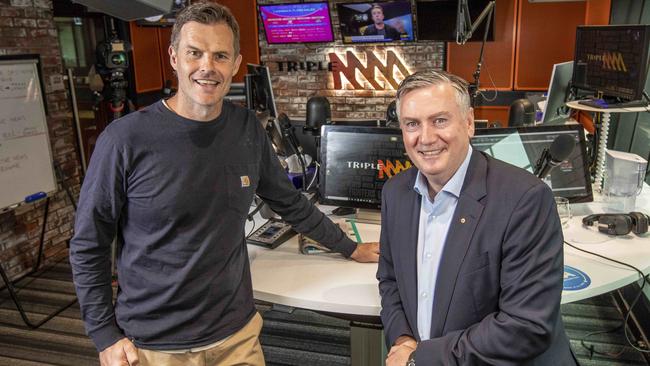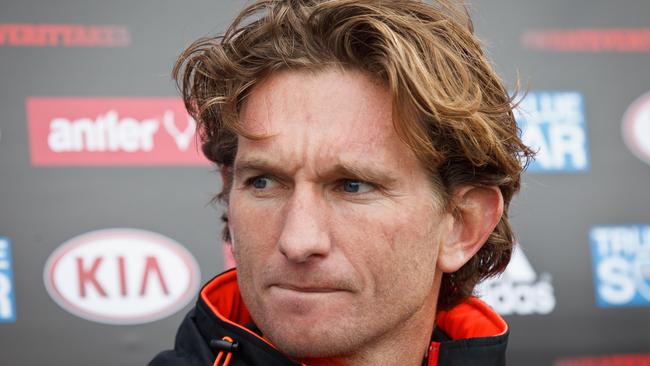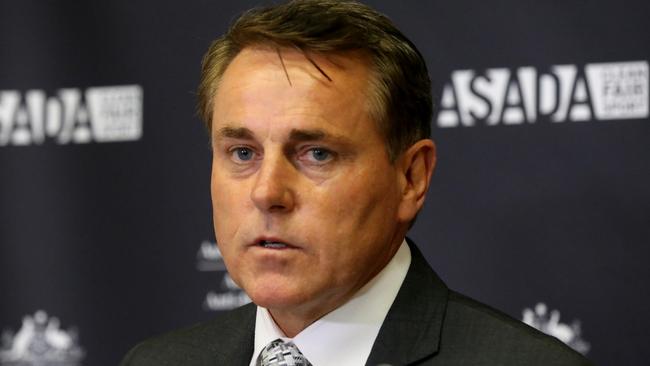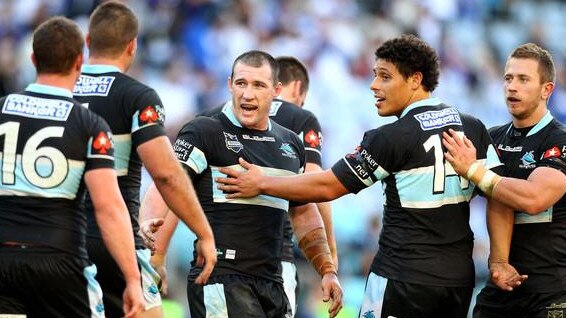James Hird’s father claims ‘Sarah’ interview on Triple M during drugs saga was ‘almost certainly a fake’
A distraught Bombers mother was put to air by Eddie McGuire after calling the station anonymously. And James Hird father is scepticle about its legitimacy.
AFL
Don't miss out on the headlines from AFL. Followed categories will be added to My News.
James Hird’s father claims “Sarah” – the distraught Essendon mother put to air by Eddie McGuire at the height of the Dons drugs scandal – was “almost certainly a fake”.
One of the turning points of footy’s greatest saga came on the morning of August 22, 2013, when a caller purporting to be the mother of a Bombers player rang through to McGuire’s Triple M breakfast radio show taking direct aim at Hird.
“It’s all right for James and the board of Essendon to say they have not cheated,” said ‘Sarah’.
“(But) the whole question is not about cheating. The whole question is about morals, it’s about ethics and it’s about trust that parents put in the club.”
The emotion-charged call came at a critical time in the scandal when the AFL executive was under fire over its own conduct and meddling in the drugs investigation.

The previous afternoon, Dons chairman Paul Little had declared war on league bosses Andrew Demetriou and Gillon McLachlan during a press conference at the Olsen Hotel in South Yarra, urging the AFL commission to step in and “take over this process, as I along with a significant percentage of the football public have lost total confidence in the AFL executive to handle this matter”.
McGuire later admitted the woman had rung through to Triple M on a private number and refused to provide information regarding her identity.
“I spoke to her before she came on air extensively,” McGuire explained.
“I was convinced enough to put her on air at a very volatile time. If she was an actress, she was the best actress in Australia.”
But 10 years on, Hird Snr said there was little doubt his son was the victim of a set up.
“The trouble with ‘Sarah’ is that no one knows to this day who she is,” he said.
“What we do know is that she was not the mother of an Essendon footballer. Eddie McGuire admitted he didn’t know who she was. Essendon interviewed every players’ parents and all denied they were ‘Sarah’.
“It is almost certain she was a plant … a fake to undermine James Hird and Essendon.”
Hird Snr said McGuire, like Bombers chairman David Evans, had betrayed his son.

“James thought of David Evans and Eddie McGuire as friends – you know, friends like people you can trust. People who will have your back. Hird was sadly mistaken,” he said.
The Hird-McGuire relationship dated back to the mid-1990s when the former Collingwood president was host of The Footy Show.
“Eddie McGuire was perhaps the biggest media personality associated with the AFL … and that relationship led to Eddie being a guest at James’ 1997 wedding,” Hird Snr said.
“But back in August 2013, he (McGuire) involved himself in the AFL’s pursuit of James Hird.
“James and Essendon sought to have the AFL charges against them heard in a proper court of law, rather than the AFL star chamber, and Collingwood under McGuire, along with the other 16 clubs supported the AFL, rather than the pursuit of truth through Australia’s judicial system.”
EX-ASADA BOSS SAYS BOMBERS INJECTING ‘ORCHESTRATED STRATEGY’
Mark Robinson and Michel Warner
Former anti-doping boss Ben McDevitt says “denial and litigation’’ by Essendon meant the 34 players missed out on a Cronulla-type outcome which would’ve seen the players banned for about six months.
Part of the ban would’ve been served in the off-season.
Unlike Cronulla, Essendon did not accept they had taken performance enhancing drugs, which blew out the saga by four years and ultimately saw the players suspended for 12 months.
McDevitt, who joined ASADA in May, 2014, said a Cronulla situation was available to the Bombers.

“At that stage, the opportunity was open to Essendon, but the whole issue about whether you call it deal, is that you had to actually admit you had a banned substance,’’ McDevitt said.
“That’s the opportunity and framework which is open to all athletes, but that was the decision Essendon made.
“Their strategy was denial and litigation and it didn’t work.
“It would’ve been a way better outcome for them and a lot less expensive, not only in terms of dollars but in terms of the emotional toll it took on them quite frankly.
“It could’ve been a lot shorter … probably in the order of six months.’’

Cronulla players pleaded guilty to taking banned substances and received backdated 12 months ban and missed only a handful of matches.
McDevitt, a former Australian Federal Police Detective who oversaw the police component of Australia’s peacekeeping operation to the Solomon Islands and the investigation into the Bali bombings, replaced Aurora Andruska as CEO of ASADA.
A month after McDevitt took the helm, show cause notices were issued against the 34 Essendon players before the Bombers and coach James Hird launched an unsuccessful Federal Court counter attack.
The show cause notices, alleging the use of banned peptide Thymosin-beta-4 sourced from China, were reissued in October 2014.
McDevitt told the Herald Sun the suspensions were the correct outcome.
“Absolutely,’’ he said.
“It was totally self-inflicted and the unfortunate thing is the club decided they would go into denial and litigation.
“So, we went to every court in the land and ultimately we ended up before the ultimate sports authority globally (the Court of Arbitration of Sport) and it found the case proven against 34 players.
“That basically they had entered into a regime … this wasn’t a one-off or random act, it was an orchestrated strategy for them to win by taking Thymosin Beta-4.
“They knew they were on the edge, they didn’t tell the club doctor about it.
“Was the result the right one? Absolutely.’’

Despite accusations of a corrupted investigation, McDevitt said he wouldn’t do anything different in his prosecution of the players.
“I played it right down the line,’’ he said. “I didn’t have anything against Essendon. The three years I was at ASADA, I think we prosecuted about 160 athletes from 15 different sports.
“My job was to apply the rules and what the framework was and once there’s an allegation, people make choices, and they were the choices Essendon made at each step of the way. “Essendon’s strategy was to deny and litigate.
“I wouldn’t have done anything differently and I couldn’t have done anything differently because if I did, and depending on what I did, I would be accused of perverting the course of justice or whatever else.’’
The 34 players were initially cleared of doping by an AFL tribunal before CAS overturned the decision in January 2016, handing down two-year backdated bans that saw them suspended for the season.
McDevitt is now a consultant in leadership, law enforcement, counter terrorism and security and sports integrity.
HIRD’S LAWYER SAYS CASE WAS ‘NOT A GREAT SENSE OF NATURAL JUSTICE’
Top silk Julian Burnside has declared former Essendon coach James Hird “the most honourable person I ever acted for”.
Burnside, 73, represented Hird during the AFL Commission “hearing” into the drugs scandal in late August 2013.
It was the high-profile human rights lawyer who informed the league in the boardroom at AFL House that Hird had agreed to a 12-month penalty after weeks of backroom threats and negotiations.
“At the outset I had no idea who James Hird was,” Burnside recalled.

“I don’t think I had heard his name, but by the end of the case I thought him the most honourable person I had ever acted for.”
In the days after the commission hearing, Burnside revealed that he was distressed by the handling of the drugs investigation.
“I don’t like what I saw … not a great sense of natural justice,” he said.
“What I saw worried me a lot. It was astonishing how much sensitive material was leaked to the press. I’m not sure who leaked it, but I’m pretty sure it wasn’t the players or the club.”
Originally published as James Hird’s father claims ‘Sarah’ interview on Triple M during drugs saga was ‘almost certainly a fake’



